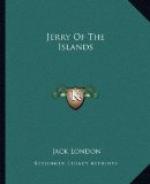And Jerry’s nose told him of how the stream of the fugitives had split and flooded past on each side and flowed together again beyond. Incidents of the flight he did encounter: a part-chewed joint of sugar-cane some child had dropped; a clay pipe, the stem short from successive breakages; a single feather from some young man’s hair, and a calabash, full of cooked yams and sweet potatoes, deposited carefully beside the trail by some Mary for whom its weight had proved too great.
The shell-fire ceased as Jerry trotted along; next he heard the rifle-fire from the landing-party, as it shot down the domestic pigs on Somo’s streets. He did not hear, however, the chopping down of the coconut trees, any more than did he ever return to behold what damage the axes had wrought.
For right here occurred with Jerry a wonderful thing that thinkers of the world have not explained. He manifested in his dog’s brain the free agency of life, by which all the generations of metaphysicians have postulated God, and by which all the deterministic philosophers have been led by the nose despite their clear denouncement of it as sheer illusion. What Jerry did he did. He did not know how or why he did it any more than does the philosopher know how or why he decides on mush and cream for breakfast instead of two soft-boiled eggs.
What Jerry did was to yield in action to a brain impulse to do, not what seemed the easier and more usual thing, but to do what seemed the harder and more unusual thing. Since it is easier to endure the known than to fly to the unknown; since both misery and fear love company; the apparent easiest thing for Jerry to have done would have been to follow the tribe of Somo into its fastnesses. Yet what Jerry did was to diverge from the line of retreat and to start northward, across the bounds of Somo, and continue northward into a strange land of the unknown.
Had Nalasu not been struck down by the ultimate nothingness, Jerry would have remained. This is true, and this, perhaps, to the one who considers his action, might have been the way he reasoned. But he did not reason it, did not reason at all; he acted on impulse. He could count five objects, and pronounce them by name and number, but he was incapable of reasoning that he would remain in Somo if Nalasu lived, depart from Somo if Nalasu died. He merely departed from Somo because Nalasu was dead, and the terrible shell-fire passed quickly into the past of his consciousness, while the present became vivid after the way of the present. Almost on his toes did he tread the wild bushmen’s trails, tense with apprehension of the lurking death he know infested such paths, his ears cocked alertly for jungle sounds, his eyes following his ears to discern what made the sounds.
No more doughty nor daring was Columbus, venturing all that he was to the unknown, than was Jerry in venturing this jungle-darkness of black Malaita. And this wonderful thing, this seeming great deed of free will, he performed in much the same way that the itching of feet and tickle of fancy have led the feet of men over all the earth.




